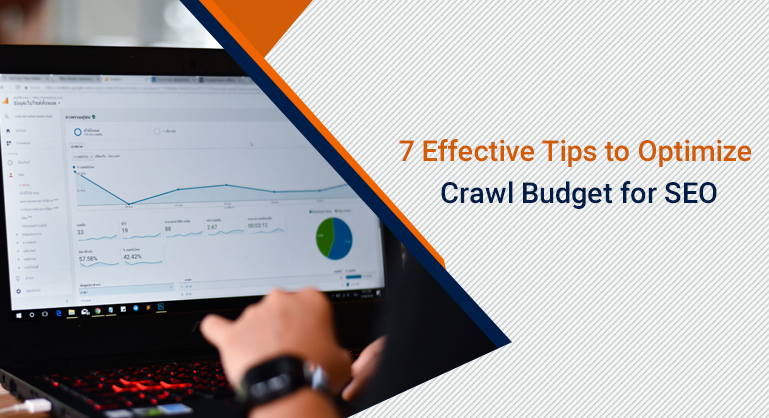What Everyone's Talking About
Check out our updates on Search Engine Optimisation, Social Media Marketing,
PPC Management Content Marketing, Facebook Advertising, e-mail Marketing etc.


Posted on: Oct 11, 2019 6 min read
An important concept of SEO that usually goes unnoticed is crawl budget. There are various tasks as well as issues an SEO expert should take into consideration so that the website can be optimised properly. In this blog, we will go through the concept of crawl budget and provide you with 7 great tips that will help you inoptimising your crawl budget for your websites’ SEO.
Crawl budget is actually the frequency with which search engine crawlers check the pages of your domain. It is defined as the maximum number of pages that Google crawls on a website.
Crawl budget optimisation is a series of steps you may take specifically to increase the rate at which search engines’ bots visit your webpages.Thus, the more often they visit, the quicker the indexwill understand that your web pages have been updated.According to London based highly experienced SEO consultant, your optimisation efforts require less time to affect the rankings on search engines.
According to Google, crawling is not a ranking factor by itself. Hence, this is sufficient to prevent SEO professionals from considering crawl budget. If you have a domain of moderate size, then you do not have to think about crawl budget. But, SEO is not a game of working on one factor and expecting astronomical results.
SEO is the process of making small and incremental changes by taking proper care of dozens of metrics.The job is to make sure that various little things are optimised properly. Besides that, though this is a major crawling factor, it is extremely good for conversions and for the entire website. It is important to be sure that nothing on the website hurts your crawl budget.
Do not crawl important pages in Robots.Txt – Managing robots.txt may be done by either using an auditor tool or by hand. It is advised to use the tool wherever possible as this will make it more convenient and effective for the website.
You can add robots.txt to your choice of tools that enableyou to allow or block crawling of any webpage of your domain within a few seconds. After this, you need to upload an edited document and so on.
Check for redirect chains – This is considered to be a common approach for improving your website.You can preferably avoid getting a single redirect chain on the whole domain. It is not possible for a large website to have 301 and 302 redirects as they seem to appear automatically.
But by bringing them together, crawl budget might get hurt to a certain point where search engine’s crawler can just stop crawling without reaching the webpage that needs to be indexed.Thus, one or two redirects might not cause much damage to the site though it is something that everyone should take proper care of.
Try to use HTML whenever possible – Professionals of a reputed SEO agency have said that Google’s crawler has been better in crawling JavaScript and has already improved crawling as well as indexing XMl and Flash.
It is suggested to stick to HTML whenever possible so that you may not hurt the chances of being with any crawler.
Do not allow HTTP errors to eat up crawl budget – Technically, both 404 and 410 pages will eat your crawl budget. If this is not sufficient, then they can even hurt the user experience. Thus, there comes the need to fix all 4xx and 5xx status codes to make them a win-win situation. In this situation, a tool should be used for site audit.
Both SE Ranking and Screaming Frog are considered to be great tools that SEO experts use for website audit.
Proper care of URL parameters – You should know that separate URLs are counted by search crawlers for separate web pages thus, wasting crawl budget. If you let Google know about URL parameters, then this is considered to be a win-win situation, save crawl budget and avoid raising any concerns leading to copied and duplicate content. Thus, make sure you add them to the Google Search Console account.
Keep sitemap updated – This is again considered to be a win-win situation for taking proper care of XML sitemap. The bots have much better time in knowing where these internal links will lead to. Try to use only those URLS that seem to be canonical for the sitemap.Also, see if it corresponds to the latest uploaded version of robots.txt.
Href lang tags are important – If you want to evaluate localised pages, then search crawlers need to employ hrefland tags. You need to inform Google about localised versions of webpages clearly.
First off, use the
in your page’s header. Where “lang_code” is a code for a supported language.You need to use the
As said by DubSEO professionals, crawl budget is, was, and will probably be an important thing to considerwhen it comes to succeeding in SEO.
Hopefully these effective tips will help you to optimise your crawl budget and improve your over all SEO performance.
